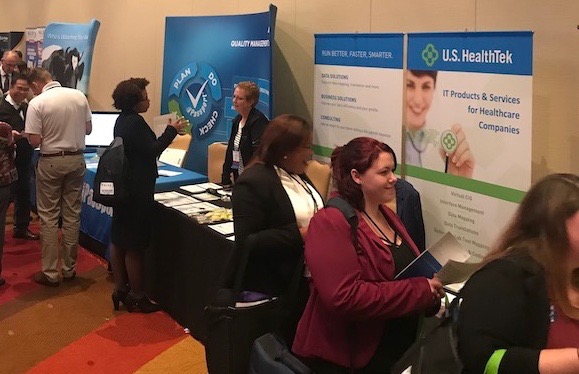Scenes from the Lab Quality Confab

Networking, a New CRM, and a Glimpse of the Future
By Mike Pratt & Lauren Sutton
[U.S. HealthTek sent our VP (Mike) and Senior Consultant (Lauren) to the Lab Quality Confab in Atlanta last week, and they tell us it was once again a worthy experience. (In fact, if you wish you were there, a digital audio recording of the 41 presentations are available here.) By all accounts, it was well-attended, there were some stand-out educational forums, and of course, there was the debut of our CRM software. Here is their report:]

Cookies brighten up every convention booth – especially the kind suitable for humans.
We’re back from the conference and have caught our collective breath from the whirlwind experience. There was a lot to see and do, and of course the opportunity to see old friends and make new ones makes us especially grateful to get to attend. Hats off to Robert Michel and his team at the Dark Report for putting on such an information-packed conference.
For us, the highlight was the debut of our new Customer Relationship Management system, fulCRM. We were busy at our booth introducing it and showing our video introduction to it, which people loved. To accompany the video, we put out some dog bone and paw print cookies (when you see the video you’ll know why). These were especially popular once we put a sign out that they were in fact made for people, not for Fido or Princess! But clearly this was the perfect show to roll out this new CRM tool, made by lab professionals for lab professionals, and there was a lot of positive feedback and interest. Bryan blogged about it last week, and if you want to learn more, please contact us for a demo.
* * *
Otherwise, Robert’s talk, “Quality Management’s Best Strategy to Survive and Thrive in the Era of Shrinking Lab Budgets” was great. He always provides significant data, spanning a number of years, so you can see meaningful fluctuations across time. His discussion on what we can expect in future legislation was valuable, as we as an industry have to increasingly always be aware of what the politicians are doing and be ready to advocate for ourselves when necessary. We also heard good things about “How Combining Lab Consolidation, Lean, Analytics and More Helped Us Manage Twice the Volume,” from Patricia Nortmann and “Effective Coaching in Support of Competency Assessments,” from Stephen Stone.
The Millennial World
Perhaps the most talked-about session came from Jeremy Schubert (MBA, MPH, Division VP of Abbott). His “How a Balanced Scorecard Can Be the Useful Bridge to Move from Lab 1.0 to Clinical Lab 2.0” was engaging. He explained that research is showing how millennials, who only want to operate within their own schedules, are changing the face of healthcare. The current model of needing to choose a PCP, call the office, schedule an appointment, get in their car to drive to a doctor’s office… then having to drive to a second location for a blood draw is not something they are interested in doing. Instead, they want the PCP to proactively contact them when there is a medical concern and provide medical advice/treatments via new methodologies. It is certainly jarring at first and hard to get your head around it, but technology is going to make the transition to a “Health Creation” model possible. (That term stems from a larger point he makes regarding the term “healthcare.” In essence, he argues that the term needs to be replaced with “Health Creation” because we need to create healthy lives using technology to our advantage as opposed to waiting for people to get sick.)
The future includes smart devices like the Apple Watch, which measures exercise and heart rate, and can perform EKGs. Or smart refrigerators, that know what you eat and how much you eat. Then there are smart toilets that can run routine tests based on the specimens “dropped in them numerous times every day.” Then we’ll have Siri and Alexa listening in with concern to see if we sound happy, sad, mad, frustrated, etc. Digital assistants like Siri are a part of this, as they’ll be ordering medication for you that will be delivered promptly to your doorstep by a drone.

Lauren at the U.S. HealthTek booth – it was hopping the whole time!
How about a world where all these devices are interfaced to an EMR, offering the provider a real-time look into the overall health of her patient? The provider can then proactively identify possible health risks and conduct an office visit with the patient via real-time video conferencing. Frightening for all of us who love tradition, but absolutely fascinating when you sit back and consider how realistic the possibilities are. He ultimately argues that a broken healthcare delivery system, coupled with extreme advancements in technology, will lead to a world that looks an awful lot like what I described above – fueled by a younger generation’s demands for easy access. If all this sounds a bit intrusive, you have a little time to adjust; Jeremy admits he does not know how or when all this will happen, but thinks we need to be prepared for it.
At the very least, it’s discussions like this, imagining the inevitable future with a roomful of your peers, that makes Lab Quality Confab worth going to! We’re already planning on being there next year.

